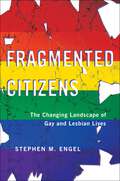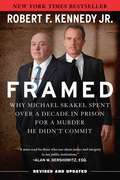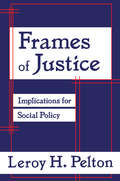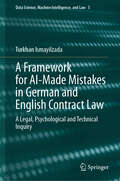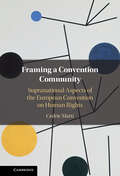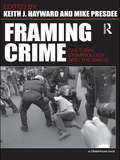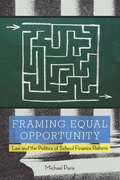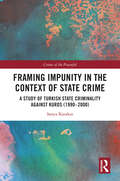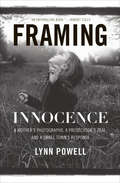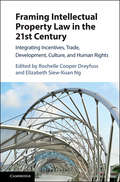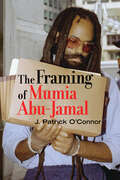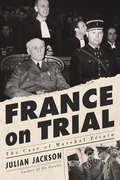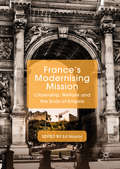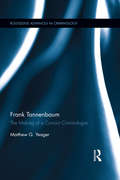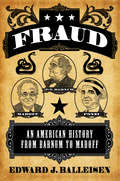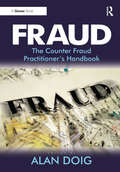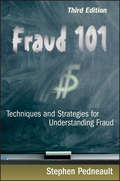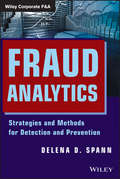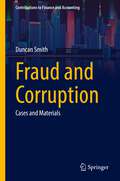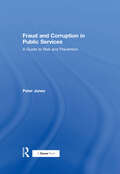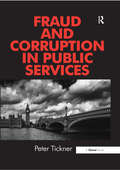- Table View
- List View
Fragmented Citizens: The Changing Landscape of Gay and Lesbian Lives
by Stephen M. EngelA sweeping historical and political account of how our present-day policy debates around citizenship and equality came to beThe landmark Supreme Court decision in June 2015 legalizing the right to same-sex marriage marked a major victory in gay and lesbian rights in the United States. Once subject to a patchwork of laws granting legal status to same-sex couples in some states and not others, gay and lesbian Americans now enjoy full legal status for their marriages wherever they travel or reside in the country. For many, the Supreme Court’s ruling means that gay and lesbian citizens are one step closer to full equality with the rest of America. In Fragmented Citizens, Stephen M. Engel contends that the present moment in gay and lesbian rights in America is indeed one of considerable advancement and change—but that there is still much to be done in shaping American institutions to recognize gays and lesbians as full citizens. With impressive scope and fascinating examples, Engel traces the relationship between gay and lesbian individuals and the government from the late nineteenth century through the present. Engel shows that gays and lesbians are more accurately described as fragmented citizens. Despite the marriage ruling, Engel argues that LGBT Americans still do not have full legal protections against workplace, housing, family, and other kinds of discrimination. There remains a continuing struggle of the state to control the sexuality of gay and lesbian citizens—they continue to be fragmented citizens. Engel argues that understanding the development of the idea of gay and lesbian individuals as ‘less-than-whole’ citizens can help us make sense of the government’s continued resistance to full equality despite massive changes in public opinion. Furthermore, he argues that it was the state’s ability to identify and control gay and lesbian citizens that allowed it to develop strong administrative capacities to manage all of its citizens in matters of immigration, labor relations, and even national security. The struggle for gay and lesbian rights, then, affected not only the lives of those seeking equality but also the very nature of American governance itself. Fragmented Citizens is a sweeping historical and political account of how our present-day policy debates around citizenship and equality came to be.
Framed: Why Michael Skakel Spent Over a Decade in Prison for a Murder He Didn't Commit
by Robert F. Kennedy Jr.On Halloween, 1975, fifteen-year-old Martha Moxley’s body was found brutally murdered outside her home in swanky Greenwich, Connecticut. Twenty-seven years after her death, the State of Connecticut spent some $25 million to convict her friend and neighbor, Michael Skakel, of the murder. The trial ignited a media firestorm that transfixed the nation. Now Skakel’s cousin Robert F. Kennedy, Jr., solves the baffling whodunit and clears Michael Skakel’s name. In this revised edition, which includes developments following the Connecticut Supreme Court decision, Kennedy chronicles how Skakel was railroaded amidst a media frenzy and a colorful cast of characters—from a crooked cop and a narcissistic defense attorney to a parade of perjuring witnesses.
Frames of Justice: Implications for Social Policy
by Leroy H. PeltonThis work is devoted to analyzing three major frames of justice--group justice, individual desert, and life affirmation--and their implications for social policy as well as their reflections in contemporary social policies. Pelton finds that all three frames of justice are reflected in the Bible and, later, the Koran. He contends that there is no evidence in the Bible of a genesis or development from one frame of justice to another. Rather, a sense of justice has existed in the human mind from time immemorial, with the three frames coexisting and manifesting themselves in both inter- and intra-group relations. The prominence of one frame over another at any particular point in history or in a particular geographical location is influenced by a variety of factors, though it is ultimately open to human choice.Pelton compares and contrasts the philosophies of nonviolence and liberalism in regard to the frames, and explores the relationships between principle, sentiment, reason, justice, and policy. He discusses social science's problematic relationship to justice in policymaking--for instance, how scholars have focused more on the effectiveness of policies, largely in terms of statistical outcomes reflecting aggregate data analyses, than on their justice. He goes on to explore in depth how frames of justice give direction to social policies, including those of genocide.Frames of Justice is an outstanding work that analyzes the question of justice and social policy, while simultaneously exploring the notion of desert in religion, philosophy, and legislation--especially within the context of the moral question of the relationship between means and ends--and contrasting it with the principle of life affirmation.
A Framework for AI-Made Mistakes in German and English Contract Law: A Legal, Psychological and Technical Inquiry (Data Science, Machine Intelligence, and Law #5)
by Turkhan IsmayilzadaThis book tries to answer the question “What happens if an AI system makes a mistake while contracting?” by applying an interdisciplinary and comparative legal methodology. It offers a tantalizing glimpse into the intricate web of legal, psychological, and technical phenomena involved, and how they are interconnected within the realm of contractual mistake doctrine as we know it today. It covers a wide range of topics, including the common origins of German and English contract law, the pivotal role of intentions as a prerequisite for effectual contracts in both jurisdictions, the classification of and psychological approach to contractual mistakes, and the complexities of AI’s participation in contract law. Particular attention is paid to the juxtaposition of human- and AI-made mistakes from the perspective of information processing. As a result, the book offers a jurisdiction-agnostic framework for AI-made contractual mistakes that can aid legislators and policymakers in their deliberations on the regulation of AI in contract law. The framework considers cultural and historical differences between German and English contract law, and thus proposes an approach that can fit both (and potentially other similar) jurisdictions with minor adjustments. In addition to these novel discussions, the work explores the views of prominent scholars and international experts in the field. As such, it will appeal to researchers and scholars in the fields of law, technology, psychology, and (especially) Artificial Intelligence. By presenting “a framework for AI-made mistakes in German and English contract law,” Dr. Ismayilzada offers a valuable contribution to the field, inviting readers to explore the uncharted territory of AI and the law. Join the author on this intellectual journey and gain insights that will redefine your perception of contracts in the age of AI.
Frameworks for Water Law Reform
by Sarah HendryThe world is currently experiencing unprecedented global change, with population increase, urbanisation, climate change and environmental degradation combining to make management of freshwater resources a critical policy focus of the twenty-first century. This timely book designs and develops an original, analytical framework for water law reform processes, using case studies across four jurisdictions. Addressing the four principal areas of water law - integrated water resource management (IWRM) and river basin planning, water rights and allocation, water pollution and quality, and water services - this book provides a comprehensive study of water law, within the context of global and regional policy agendas. Case studies from England, Scotland, South Africa and Queensland, Australia, are presented, providing comparators from both common law and mixed jurisdictions, from the northern and southern hemispheres, and from developed and developing countries. A legislative framework is proposed for water law reform processes, and the consequences of different reform options are considered and investigated. A valuable resource for academics and graduate students in environmental law, resource management, hydrology and social science, this book is also highly relevant to policymakers, NGOs and legal practitioners.
Framing a Convention Community: Supranational Aspects of the European Convention on Human Rights
by Cedric MartiThe European Convention on Human Rights (ECHR) has evolved from an international agreement into a highly integrated legal community with an ever more pervasive effect on domestic law and individuals. The supranational authority of the European Court of Human Rights bypasses the nation state in a growing number of other areas. Understanding the evolution of the ECHR and its Court may help in explaining and contextualising growing resistance against the Court, and in developing possible responses. Examining the Convention system through the prism of supranationality, Cedric Marti offers a fresh, comprehensive and interdisciplinary perspective on the expanding adjudicatory powers of the Court, including law-making. Marti addresses the growing literature of institutional studies on human rights enforcement to ascertain the particularities of the ECHR and its relationship to domestic legal systems. This study will be of great value to both scholars of international law and human rights practitioners.
Framing Crime: Cultural Criminology and the Image
by Keith J. HaywardIn a world in which media images of crime and deviance proliferate, where every facet of offending is reflected in a ‘vast hall of mirrors’, Framing Crime: Cultural Criminology and the Image makes sense of the increasingly blurred line between the real and the virtual. Images of crime and crime control have become almost as 'real' as crime and criminal justice itself. The meaning of both crime and crime control now resides, not solely in the essential – and essentially false – factuality of crime rates or arrest records, but also in the contested processes of symbolic display, cultural interpretation, and representational negotiation. It is essential, then, that criminologists are closely attuned to the various ways in which crime is imagined, constructed and framed within modern society. Framing Crime responds to this demand with a collection of papers aimed at helping the reader to understand the ways in which the contemporary ‘story of crime’ is constructed and promulgated through the image. It also provides the relevant analytical and research tools to unearth the hidden social and ideological concerns that frequently underpin images of crime, violence and transgression. Framing Crime will be of interest to students and academics in the fields of criminology, crime and the media, and sociology.
Framing Equal Opportunity
by Michael ParisIn order to illuminate the crucial and often neglected role of legal translation in litigation-driven reform efforts, Paris (political science, City U. of New York-College of Staten Island) explores legal aspects--lawyers, rights claims, litigation, courts, and the like--in struggles to produce more egalitarian school finance and education policies. He focuses attention on would-be reformers and their mobilization of law and courts. Comparative case studies in New Jersey 1970-2009 and Kentucky 1983-2009 demonstrate details about the interplay between law and politics in litigation-based reform projects. Annotation ©2010 Book News, Inc. , Portland, OR (booknews. com)
Framing Impunity in the Context of State Crime: A Study of Turkish State Criminality Against Kurds (1990- 2000) (Crimes of the Powerful)
by Sanya KarakasThis book introduces a new conceptual framework for impunity within state crime theory and uses Turkish state criminality against Kurds between 1990 and 2000 as a case study. It develops an understanding of impunity that goes beyond viewing the state solely as an actor, facilitator, or denier of crime. It argues for an expanded definition of state crime to encompass criminal acts and processes undertaken by states, including impunity.Building on field research, case analysis, and interviews, this book digs deep into the mechanics of impunity and ways in which the Turkish state has evaded punishment for its criminal acts. In doing so, Framing Impunity in the Context of State Crime uncovers a close connection between the crimes of the government and the impunity which allowed those crimes to flourish. It demonstrates that state violence and impunity are endemic in the structural design of the Turkish state and serve to further both the state goals of ethnic and religious assimilation and the subsequent persecution of those who refused to be assimilated into the new state construction. The book uses Stanley Cohen’s work on states of denial techniques to examine how states justify their illegal acts in order to deny and/or to evade responsibility for their crimes. Cohen’s work on denial at the organisational level is central to the question of impunity because, as a form of state crime, impunity involves various state institutions or actors representing the very state machinery deployed to conceal and deny state criminality.An accessible and compelling read, this book will appeal to law students, scholars, researchers, NGOs, and civil society organisations. It will have broader applicability beyond the case study of Turkey and will be valuable to academics and policymakers worldwide who focus on the intersection of state crime and impunity.
Framing Innocence: A Mother's Photographs, a Prosecutor's Zeal, and a Small Town's Response
by Lynn PowellThe harrowing true story of a mother whose innocent photos of her daughter resulted in child pornography charges—&“an enthralling book&” (Robert Coles). When Oberlin, Ohio, resident Cynthia Stewart dropped off eleven rolls of film at a drugstore near her home, she had no idea that two snapshots of her eight-year-old daughter would cause the county prosecutor to arrest her, take her away in handcuffs, threaten to remove her child from her home, and charge her with crimes that carried the possibility of sixteen years in prison. Thankfully, Cynthia&’s community came to her defense and supported her through the long legal battle. In Framing Innocence, poet and author Lynn Powell—who was one of Cynthia&’s neighbors—brilliantly probes the many questions raised: when does a photograph of a naked child cross the line from innocent snapshot to child pornography? When does a prosecution cross the line from vigorous to overzealous? When does the parent, and when does the state, know best? This &“fascinating . . . immediate and compelling&” story plumbs the perfect storm of events that put a loving family in a small American town at risk (Booklist). &“[A] well-written, absorbing book.&” —The Plain Dealer
Framing Intellectual Property Law in the 21st Century: Integrating Incentives, Trade, Development, Culture, and Human Rights
by Rochelle Cooper Dreyfuss Elizabeth Siew-Kuan NgAs knowledge production has become a more salient part of the economy, intellectual property laws have expanded. From a backwater of specialists in patent, copyright, and trademark law, intellectual property has become linked to trade through successive international agreements, and appreciated as a key to both economic and cultural development. Furthermore, law has begun to engage the interest of economists, political theorists, and human rights advocates. But because each discipline sees intellectual property in its own way, legal scholarship and practice have diverged, and the debate over intellectual property law has become fragmented. This book is aimed at bringing this diverse scholarship and practice together. It examines intellectual property through successive lenses (incentive theory, trade, development, culture, and human rights) and ends with a discussion of whether and how these fragmented views can be reconciled and integrated.
The Framing of Mumia Abu-Jamal
by J. Patrick O'ConnorMumia Abu-Jamal--the most famous death-row inmate in the United States--was sentenced to death in 1982 for allegedly killing police officer Daniel Faulkner. Using the preponderance of evidence to establish that Faulkner shot Abu-Jamal as he approached him and that a passenger in Abu-Jamal's brother's car, Kenneth Freeman, then killed Faulkner, this study convincingly shows how the Philadelphia Police Department and District Attorney's Office framed Abu-Jamal for Faulkner's killing. In addition, unlike any other book or article on this subject, it describes the overarching role in the case that then-mayor Frank Rizzo and a small, radical, back-to-nature cult called MOVE played.
France on Trial: The Case of Marshal Pétain
by Julian JacksonFor three weeks in July 1945 all eyes were fixed on a humid Paris, where France’s disgraced former head of state was on trial, accused of masterminding a plot to overthrow democracy. Would Philippe Pétain, hero of Verdun, be condemned as the traitor of Vichy?In the terrible month of October 1940, few things were more shocking than the sight of Marshal Philippe Pétain—supremely decorated hero of the First World War, now head of the French government—shaking hands with Hitler. Pausing to look at the cameras, Pétain announced that France would henceforth collaborate with Germany. “This is my policy,” he intoned. “My ministers are responsible to me. It is I alone who will be judged by History.”Five years later, in July 1945, after a wave of violent reprisals following the liberation of Paris, Pétain was put on trial for his conduct during the war. He stood accused of treason, charged with heading a conspiracy to destroy France’s democratic government and collaborating with Nazi Germany. The defense claimed he had sacrificed his personal honor to save France and insisted he had shielded the French people from the full scope of Nazi repression. Former resisters called for the death penalty, but many identified with this conservative military hero who had promised peace with dignity.The award-winning author of a landmark biography of Charles de Gaulle, Julian Jackson uses Pétain’s three-week trial as a lens through which to examine one of history’s great moral dilemmas. Was the policy of collaboration “four years to erase from our history,” as the prosecution claimed? Or was it, as conservative politicians insist to this day, a sacrifice that placed pragmatism above moral purity? As head of the Vichy regime, Pétain became the lightning rod for collective guilt and retribution. But he has also been an icon of the nationalist right ever since. In France on Trial, Jackson blends courtroom drama, political intrigue, and brilliant narrative history to highlight the hard choices and moral compromises leaders make in times of war.
France's Modernising Mission
by Ed NaylorThis volume explores how France's 'modernising mission' unfolded during the post-war period and its reverberations in the decades after empire. In the aftermath of the Second World War, France sought to reinvent its empire by transforming the traditional 'civilising mission' into a 'modernising mission'. Henceforth, French claims to rule would be based on extending citizenship rights and the promise of economic development and welfare within a 'Greater France'. In the face of rising anti-colonial mobilization and a new international order, redefining the terms that bound colonised peoples and territories to the metropole was a strategic necessity but also a dynamic which Paris struggled to control. The language of reform and equality was seized upon locally to make claims on metropolitan resources and wrest away the political initiative. Intertwined with coercion and violence, the struggle to define what 'modernisation' would mean for colonised societies was a key factor in the wider process of decolonisation. Contributions by leading specialists extend geographically from Africa to the Pacific and to metropolitan France itself, examining a range of topics including education policy, colonial knowledge production, rural development and slum clearance.
Frank Tannenbaum: The Making of a Convict Criminologist (Routledge Advances in Criminology)
by Matthew G. YeagerFrank Tannenbaum and the Making of a Convict Criminologist is a historical biography about Columbia University professor Frank Tannenbaum and his contribution to American criminology. Tannenbaum was a major figure in criminology in the early twentieth century, and is known for his contributions to labeling theory, particularly his conception of the "dramatization of evil" presented in his 1938 book, Crime and Community. Tannenbaum served a year on Blackwell’s Island in New York City for labor disturbances in 1914 and subsequently became a prison reformer, writing about his experiences with the American penal system and serving as the official reporter for the Wickersham Commission’s study on Penal Institutions, Probation, and Parole in 1931. This book explores his unique early career, and his influence on convict criminology, drawing on his personal papers housed at the Butler Library at Columbia University.
Franz Kafka: The Office Writings (Obras Selectas Ser.)
by Franz KafkaFranz Kafka: The Office Writings brings together, for the first time in English, Kafka's most interesting professional writings, composed during his years as a high-ranking lawyer with the largest Workmen's Accident Insurance Institute in the Czech Lands of the Austro-Hungarian Empire. Franz Kafka (1883-1924) is commonly recognized as the greatest German prose writer of the twentieth century. It is less well known that he had an established legal career. Kafka's briefs reveal him to be a canny bureaucrat, sharp litigator, and innovative thinker on the social, political, and legal issues of his time. His official preoccupations inspired many of the themes and strategies of the novels and stories he wrote at night.These documents include articles on workmen's compensation and workplace safety; appeals for the founding of a psychiatric hospital for shell-shocked veterans; and letters arguing relentlessly for a salary adequate to his merit. In adjudicating disputes, promoting legislative programs, and investigating workplace sites, Kafka's writings teem with details about the bureaucracy and technology of his day, such as spa elevators in Marienbad, the challenge of the automobile, and the perils of excavating in quarries while drunk. Beautifully translated, with valuable commentary by two of the world's leading Kafka scholars and one of America's most eminent civil rights lawyers, the documents cast rich light on the man and the writer and offer new insights to lovers of Kafka's novels and stories.
Fraud: An American History from Barnum to Madoff
by Edward J. BalleisenThe United States has always proved an inviting home for boosters, sharp dealers, and outright swindlers. Worship of entrepreneurial freedom has complicated the task of distinguishing aggressive salesmanship from unacceptable deceit, especially on the frontiers of innovation. At the same time, competitive pressures have often nudged respectable firms to embrace deception. As a result, fraud has been a key feature of American business since its beginnings. In this sweeping narrative, Edward Balleisen traces the history of fraud in America—and the evolving efforts to combat it—from the age of P. T. Barnum through the eras of Charles Ponzi and Bernie Madoff. Starting with an early nineteenth-century American legal world of "buyer beware," this unprecedented account describes the slow, piecemeal construction of modern regulatory institutions to protect consumers and investors, from the Gilded Age through the New Deal and the Great Society. It concludes with the more recent era of deregulation, which has brought with it a spate of costly frauds, including the savings and loan crisis, corporate accounting scandals, and the recent mortgage-marketing debacle. By tracing how Americans have struggled to foster a vibrant economy without enabling a corrosive level of fraud, this book reminds us that American capitalism rests on an uneasy foundation of social trust.
Fraud: The Counter Fraud Practitioner's Handbook (Crime And Society Ser.)
by Alan DoigFraud: The Counter Fraud Practitioner's Handbook looks at fraud investigation methods and explores the practical options for preventing and remedying fraud. An effective fraud and financial crime strategy involves intelligence and prevention, criminal and civil legal procedures, and asset recovery, all of which may involve investigators, internal auditors, security managers, in-house and external legal counsel and advisors. Your strategy depends on the outcomes you are seeking, the nature of the fraud or crime committed and the countries involved. Fraud provides a clear picture of the role of compliance, civil and criminal legal process in any fraud strategy. Chapters then cover investigation strategies for each of the following types of fraud: benefit, health, procurement, employee, telecoms, fiscal, corporate, charity, legal and accounting. Part Three explores the practical options for fraud prevention and remediation, including both civil and criminal asset recovery. This is an essential reference for both public and private sector fraud and security specialists who need to understand the strengths and weaknesses of each element of their organization's strategy against fraud and are seeking to learn from the approach of their colleagues in other industries or organizations. Written by and for practitioners, it is a handbook that deals with the knowledge, detail and the craft that underpins all effective anti-fraud work.
Fraud 101
by Stephen PedneaultA straightforward guide explaining the nature of financial fraud Fraud continues to be one of the fastest growing and most costly crimes in the United States and around the world. The more an organization can learn about fraud in general and the potential fraud risks that threaten the financial stability of the organization's cash flow, the better that organization will be equipped to design and implement measures to prevent schemes from occurring in the first place. Fraud 101, Third Edition serves as an enlightening tool for you, whether you are a business owner or manager, an accountant, auditor or college student who needs to learn about the nature of fraud. In this invaluable guide, you will discover and better understand the inner workings of numerous financial schemes and internal controls to increase your awareness and possibly prevent fraud from destroying your organization's financial stability. It offers guidance, understanding, and new, real-world case studies on the major types of fraud, including An understanding of why fraud is committed An overview of financial fraud schemes White-collar crime Uncovering employee embezzlements Establishing internal fraud controls The nature of collecting evidence With case studies included throughout the book to gain insight to the real world of fraud, Fraud 101, Third Edition describes the features of fraud and then provides proven methods of prevention, as well as solutions to expose different types of fraud.
Fraud Analysis Techniques Using ACL
by David Coderre<P>Fraud Analysis Techniques Using ACL offers auditors and investigators: <P>Authoritative guidance from David Coderre, renowned expert on the use of computer-assisted audit tools and techniques in fraud detection <P>A website containing an educational version of ACL from the world leader in fraud detection software <P>An accompanying website containing a thorough Fraud Toolkit with two sets of customizable scripts to serve your specific audit needs <P>Case studies and sample data files that you can use to try out the tests <P>Step-by-step instructions on how to run the tests <P>A self-study course on ACL script development with exercises, data files, and suggested answers <P>The toolkit also contains 12 'utility scripts' and a self-study course on ACL scripting which includes exercises, data files, and proposed answers. <P>Filled with screen shots, flow charts, example data files, and descriptive commentary highlighting and explaining each step, as well as case studies offering real-world examples of how the scripts can be used to search for fraud, Fraud Analysis Techniques Using ACL is the only toolkit you will need to harness the power of ACL to spot fraud.
Fraud Analytics
by Delena D. SpannProven guidance for expertly using analytics in fraud examinations, financial analysis,auditing and fraud prevention Fraud Analytics thoroughly reveals the elements of analysis that are used in today'sfraudexaminations, fraud investigations, and financial crime investigations. This valuable resourcereviews the types of analysis that should be considered prior to beginning an investigation andexplains how to optimally use data mining techniques to detect fraud. Packed with examples andsample cases illustrating pertinent concepts in practice, this book also explores the two majordata analytics providers: ACL and IDEA. Looks at elements of analysis used in today's fraud examinations Reveals how to use data mining (fraud analytic) techniques to detect fraud Examines ACL and IDEA as indispensable tools for fraud detection Includes an abundance of sample cases and examples Written by Delena D Spann, Board of Regent (Emeritus) for the Association of CertifiedFraud Examiners (ACFE), who currently serves as Advisory Board Member of the Association ofCertified Fraud Examiners, Board Member of the Education Task Force of the Association ofCertified Anti-Money Laundering Specialists ASIS International (Economic Crime Council) andAdvisory Board Member of the Robert Morris University (School of Business), FraudAnalyticsequips you with authoritative fraud analysis techniques you can put to use right away.
Fraud and Corruption: Cases and Materials (Contributions to Finance and Accounting)
by Duncan SmithThis book discusses and analyses fraud and corruption cases from many industries including construction, finance, pharmaceutical, transport, retail, medical, health, communication, education and military.The book is divided into two sections. The first part presents case studies that cover several industry sectors, including not only well-known frauds like Bernie Madoff, Wells Fargo and the Enron case, but also recent events such as the Theranos/Elisabeth Holmes case. The second section of the book includes materials on fraud and corruption such as the full text of the United Nations Convention Against Corruption, the OECD Convention on Combating Bribery of Foreign Public Officials in International Business, and the EIB’s Anti-Fraud Policy and Whistleblowing Policy. It also includes examples about current corporate anti-corruption policies from companies like Apple, Tesla and Coca Cola. For interested readers, the book offers additionally a list of films that realistically cover the topics fraud, corruption and whistleblowing.
Fraud and Corruption in Public Services: A Guide to Risk and Prevention
by Peter JonesFraud, corruption and bribery in and around public services have become an increasing concern in recent years. The reported level of fraud and corruption affecting the public sector has remained unacceptably high despite numerous national and international initiatives intended to tackle these crimes and their consequences. Fraud and Corruption in Public Services is a definitive, practical guide to the diverse risks that arise in central and local government. There is guidance on civil and criminal law around fraud, bribery and corruption as well as the national and international governmental measures and initiatives for countering this form of criminality. Most importantly of all, the book offers advice, practical examples and strategies for preventing and combating fraud, bribery and corruption. The text is readable, well-informed and intensely practical; illustrated throughout with real-life examples from the author's 40 year career.
Fraud and Corruption in Public Services: A Guide To Risk And Prevention
by Peter TicknerFraud, corruption and bribery in and around public services have become an increasing concern in recent years. The reported level of fraud and corruption affecting the public sector has remained unacceptably high despite numerous national and international initiatives intended to tackle these crimes and their consequences. Fraud and Corruption in Public Services is a definitive, practical guide to the diverse risks that arise in central and local government. There is guidance on civil and criminal law around fraud, bribery and corruption as well as the national and international governmental measures and initiatives for countering this form of criminality. Most importantly of all, the book offers advice, practical examples and strategies for preventing and combating fraud, bribery and corruption. The text is readable, well-informed and intensely practical; illustrated throughout with real-life examples from the author's 40 year career.
Fraud and Misconduct in Biomedical Research, 4th edition
by Frank Wells Michael FarthingNow in its fourth edition, Fraud and Misconduct in Biomedical Research boasts an impressive list of contributors from around the globe and introduces a new focus for the book, transforming it from a series of monographs into a publication that will quickly become an essential textbook on all areas of research fraud and misconduct.Key features inclu
